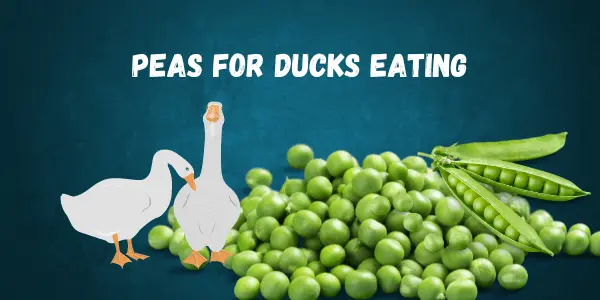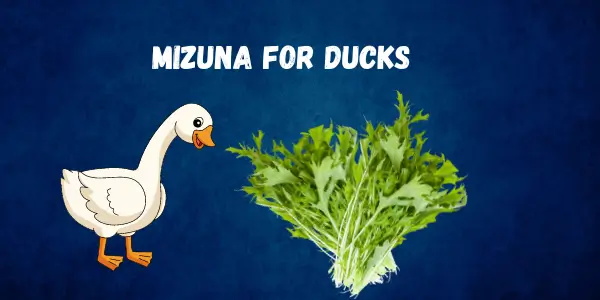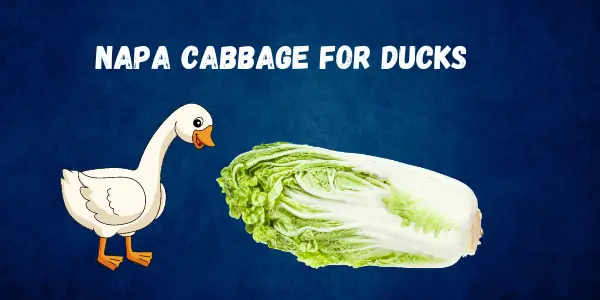Can Ducks Eat Bok Choy? Nutritional Insights and Feeding Guide
Published: 8 Sep 2024
Ducks eat a variety of foods, but can they eat bok choy? Bok choy is a leafy green vegetable rich in vitamins and minerals. It is safe for ducks in moderation, but preparation matters. Understanding its nutritional value and how it fits into a duck’s diet is essential for proper feeding.
Understanding Ducks’ Diet and Nutritional Needs
Ducks are omnivores, meaning they consume both plant and animal-based foods. Their natural diet includes aquatic plants, insects, small fish, grains, and seeds.
Wild ducks forage in water and on land, adapting their diet based on seasonal availability. Leafy greens are a part of their intake, but they also rely on protein-rich sources to meet their energy needs.
Common Vegetables and Foods Ducks Can Eat
Ducks benefit from a variety of vegetables, but not all are safe. Leafy greens like lettuce, kale, and bok choy can be included in their diet. Other safe vegetables include peas, cucumbers, and carrots.
Ducks should also consume grains, fruits, and protein sources like mealworms or small fish. Some vegetables, such as onions and raw potatoes, should be avoided due to potential toxicity.
Nutritional Value of Bok Choy for Ducks
Bok choy is a nutrient-rich vegetable containing essential vitamins and minerals. It provides:
- Vitamin A – Supports immune health and vision.
- Vitamin C – Acts as an antioxidant and aids in disease prevention.
- Vitamin K – Important for blood clotting and bone health.
- Calcium and Phosphorus – Essential for strong bones and eggshell production.
With its low-calorie content and high water content, bok choy is a hydrating and beneficial food when fed in moderation. However, excessive feeding may cause digestive issues.

Can Ducks Eat Bok Choy Raw or Cooked?
Can Bok Choy Leaves Be Eaten Raw?
Yes, ducks can eat bok choy leaves raw. The lighter leaves are easy to digest, and raw bok choy retains its full nutritional content. However, washing the leaves thoroughly is necessary to remove pesticides or contaminants. Feeding raw bok choy in small amounts prevents digestive discomfort.
Can Bok Choy Be Eaten Uncooked or Should It Be Cooked?
Bok choy can be fed both raw and cooked, but raw is preferable. Cooking reduces some vitamin content, particularly vitamin C.
If serving cooked bok choy, avoid using oil, salt, or seasoning, as these can be harmful to ducks. Steaming or boiling bok choy until soft can help with digestion, especially for young ducks or duck breeds.
Health Benefits and Risks of Feeding Bok Choy to Ducks
| Health Benefits and Risks of Feeding Bok Choy to Ducks |
|---|
|
Bok choy provides essential nutrients that contribute to a duck’s well-being. It contains:
With a high water content and fiber, bok choy also supports digestion. However, it should be part of a balanced diet rather than a primary food source. |
Potential Risks: Digestive Issues and Overfeeding Concerns
While bok choy is nutritious, excessive feeding can lead to digestive problems. Overeating leafy greens may cause:
- Diarrhea – High water content can disrupt digestion if given in large quantities.
- Nutrient Imbalance – Too much bok choy may replace essential grains and proteins in a duck’s diet.
- Goitrogens – Bok choy contains compounds that may interfere with thyroid function when consumed in excessive amounts.
How to Safely Feed Bok Choy to Ducks
- Raw Bok Choy – Best option, as it retains its full nutritional value. Chop it into small pieces to prevent choking.
- Cooked Bok Choy – Safe if steamed or boiled without salt, oil, or seasoning. Cooking softens the stems, making it easier to eat.
- Avoid Wilted or Spoiled Bok Choy – Old vegetables may contain mold or harmful bacteria. Always serve fresh bok choy.
How Much Bok Choy Should Ducks Eat? Recommended Portions
Ducks should eat bok choy in moderation. As a general guideline:
- Offer bok choy as a treat, not a meal replacement.
- Feed small amounts (a few leaves per duck).
- Mix bok choy with other vegetables and grains for a balanced diet.
Comparing Bok Choy to Other Leafy Greens
Bok choy is one of many leafy greens ducks can eat. Compared to other vegetables:
- Lettuce – Has lower nutritional value but is safe in small amounts.
- Spinach – Contains oxalates that may interfere with calcium absorption if overfed.
- Kale – Nutrient-dense but should be fed in moderation due to goitrogens.
- Cabbage – Similar to bok choy but may cause bloating if overfed.
FAQs – Ducks Having Bok Choy
Ducks can eat bok choy and tomatoes together, but caution is necessary. While ripe tomatoes are safe in small amounts, unripe tomatoes and their leaves contain solanine, which is toxic to ducks. When feeding tomatoes with bok choy, ensure the tomatoes are fully ripe and offered in moderation.
Baby bok choy is just a younger version of regular bok choy. It has a milder taste and more tender leaves, making it easier for ducks to eat. Nutritionally, it contains similar vitamins and minerals but has slightly higher water content. Both baby and mature bok choy are safe for ducks, but feeding should be in small portions.
Ducks should not eat bok choy seeds. Seeds are hard to digest and provide little nutritional value. Some seeds may also contain natural compounds that affect digestion. It’s best to feed ducks only the leaves and stems of bok choy.
Yes, both chickens and ducks can eat bok choy. It is a safe vegetable for poultry, providing hydration and nutrients. However, feeding should be balanced with other foods like grains, protein sources, and fruits to maintain proper nutrition.
Baby ducks can eat bok choy, but in very small amounts. Their digestive systems are still developing, and they require a diet rich in protein for proper growth. While bok choy provides vitamins like Vitamin A, C, and K, excessive feeding may lead to digestive discomfort. To ensure safety:
- Introduce bok choy after 2–3 weeks of age.
- Chop it into tiny pieces to prevent choking.
- Offer it occasionally, alongside a balanced duckling feed.
Ducks can eat both the leaves and stems of bok choy. These parts are rich in nutrients and easy to digest when served raw or lightly cooked. However, ducks should not eat the seeds, as they are hard to digest and provide little nutritional value. Always wash bok choy before feeding to remove any pesticides or dirt.
Bok choy should be treated as an occasional snack, not a primary food source. While it offers valuable nutrients, it does not provide all the essential proteins and carbohydrates ducks need. An ideal diet includes:
Grains (corn, oats, wheat) – For energy.
Protein sources (insects, mealworms) – Essential for growth and egg production.
Leafy greens (bok choy, lettuce, kale) – For added vitamins and hydration.
Feeding too much bok choy can lead to nutrient imbalances and digestive issues, so moderation is key.
Yes, ducks can eat pak choi. Pak choi and bok choy are often used interchangeably, as both belong to the Brassica family. Their nutritional content is nearly identical, offering similar vitamins, minerals, and hydration benefits. The main difference is that pak choi has longer, thinner stalks compared to bok choy’s shorter, bulbous base. Both are safe for ducks when fed in moderation.
Other birds, such as chickens, geese, and pet birds, can eat bok choy, but their dietary needs vary:
- Chickens – Can eat bok choy like ducks, but should also have a high-protein diet.
- Geese – Prefer grazing on grass but can have bok choy in small amounts.
- Parrots and small birds – Can eat bok choy, but should have a variety of fruits and seeds.
Regardless of the bird species, bok choy should be offered fresh, pesticide-free, and in limited amounts to avoid digestive issues.
Conclusion
Ducks can eat bok choy, but it should be a small part of a varied diet. The leaves and stems provide essential nutrients, while the seeds should be avoided. Whether raw or lightly cooked, bok choy can be a hydrating and vitamin-rich treat for ducks.
However, overfeeding may cause digestive concerns, so portion control is important. By combining bok choy with grains, protein sources, and other vegetables, you can ensure a balanced and nutritious diet for ducks.

- Be Respectful
- Stay Relevant
- Stay Positive
- True Feedback
- Encourage Discussion
- Avoid Spamming
- No Fake News
- Don't Copy-Paste
- No Personal Attacks

- Be Respectful
- Stay Relevant
- Stay Positive
- True Feedback
- Encourage Discussion
- Avoid Spamming
- No Fake News
- Don't Copy-Paste
- No Personal Attacks





